By: Friedrich Nietzsche (1844-1900) |
|---|
 Case of Wagner / Nietzsche Contra Wagner / Selected Aphorisms
Case of Wagner / Nietzsche Contra Wagner / Selected Aphorisms
A collection of three of Nietzsche's writings concerning the music of Wagner. In particular, he relates Wagner's music as degenerate, unrefined and unintelligent and relates it to a gradually degenerating German culture and society. The translator provides a detailed introduction.
|
 Human, All Too Human: A Book For Free Spirits, Part I
Human, All Too Human: A Book For Free Spirits, Part I
"Human, all-too-Human, is the monument of a crisis. It is entitled: 'A book for free spirits,' and almost every line in it represents a victory—in its pages I freed myself from everything foreign to my real nature. Idealism is foreign to me: the title says, 'Where you see ideal things, I see things which are only—human alas! all-too-human!' I know man better—the term 'free spirit' must here be understood in no other sense than this: a freed man, who has once more taken possession of himself."
|
 Birth of Tragedy
Birth of Tragedy
In this famous early work of German philosopher Friedrich Nietzsche, he investigates the artistic characteristics of Apollonian and Dionysian characteristics in Greek art, specifically in Greek tragedy as it evolved. Then he applies his conclusions about Greek tragedy to the state of modern art, especially modern German art and specifically to the operas of Richard Wagner.
|
 Early Greek Philosophy & Other Essays (Version 2)
Early Greek Philosophy & Other Essays (Version 2)
“The essays contained in this volume treat of various subjects. With the exception of perhaps one we must consider all these papers as fragments. Written during the early Seventies, and intended mostly as prefaces, they are extremely interesting, since traces of Nietzsche's later tenets—like Slave and Master morality, the Superman—can be found everywhere. But they are also very valuable on account of the young philosopher's daring and able handling of difficult and abstruse subjects. "Truth and Falsity," and "The Greek Woman" are probably the two essays which will prove most attractive to the average reader.” - Summary by Maximilian Mügge, Translator
|
By: Friedrich Schiller |
|---|
 The Thirty Years War
The Thirty Years War
The History of the Thirty Years War is a five volume work, which followed his very successful History of the Revolt of the Netherlands. Written for a wider audience than Revolt, it is a vivid history, colored by Schiller’s own interest in the question of human freedom and his rationalist optimism. Volume 1 covers the background of the war, through the Battle of Prague in late 1620. (Introduction by Alan Winterrowd)
|
 Mary Stuart
Mary Stuart
Schiller's tragedy depicts the final days of Mary, Queen of Scots, who has been imprisoned by her cousin, Queen Elizabeth I, because of her potential claim on the English throne. The action of the play revolves around an attempt to rescue Mary from prison and Elizabeth's indecision over whether or not to have her executed. The 1801 translation is by Joseph Mellish, a friend of Schiller's.
|
 Don Carlos
Don Carlos
|
 Maid of Orleans
Maid of Orleans
|
 History of the Revolt of the Netherlands
History of the Revolt of the Netherlands
|
 The History of the Thirty Years' War
The History of the Thirty Years' War
|
 Fiesco; or, the Genoese Conspiracy
Fiesco; or, the Genoese Conspiracy
|
By: G. K. Chesterton |
|---|
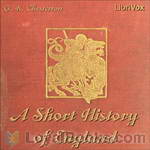 A Short History of England
A Short History of England
Gilbert Keith Chesterton was a prolific writer on many topics. His views of history were always from the standpoint of men and their interactions, and it may fairly be said he saw all of history as a battle between civilization and barbarism. So it has always been, and that remains true even today.“But it is especially in the matter of the Middle Ages that the popular histories trample upon the popular traditions. In this respect there is an almost comic contrast between the general information...
|
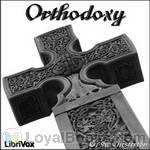 Orthodoxy
Orthodoxy
Orthodoxy is a book that has become a classic of Christian apologetics. In the book's preface Chesterton states the purpose is to "attempt an explanation, not of whether the Christian faith can be believed, but of how he personally has come to believe it." In it, Chesterton presents an original view of the Christian religion. He sees it as the answer to natural human needs, the "answer to a riddle" in his own words, and not simply as an arbitrary truth received from somewhere outside the boundaries of human experience.
|
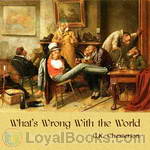 What's Wrong With the World
What's Wrong With the World
Gilbert Keith Chesterton (1874–1936) has been called the “prince of paradox.” Time magazine observed of his writing style: “Whenever possible Chesterton made his points with popular sayings, proverbs, allegories—first carefully turning them inside out.” His prolific and diverse output included journalism, philosophy, poetry, biography, Christian apologetics, fantasy and detective fiction. The title of Chesteron’s 1910 collection of essays was inspired by a title given to him two years earlier by The Times newspaper, which had asked a number of authors to write on the topic: “What’s wrong with the world?”...
|
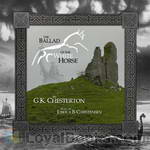 The Ballad of the White Horse
The Ballad of the White Horse
An English epic poem that follows the exploits of Alfred the Great in his defense of Christian civilization in England from the heathen nihilism of the North. Following a string of defeats at the hands of the invading Danes, a vision from heaven in the river island of Athelney fills Alfred with joy and hope. Though it gives no promise of victory in the coming struggle, it inspires him to rally his chieftains for a last stand against the invading hordes. His adventures lead throughout the country...
|
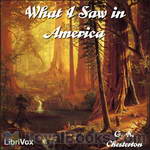 What I Saw in America
What I Saw in America
“Let me begin my American impressions with two impressions I had before I went to America. One was an incident and the other an idea; and when taken together they illustrate the attitude I mean. The first principle is that nobody should be ashamed of thinking a thing funny because it is foreign; the second is that he should be ashamed of thinking it wrong because it is funny.” (Gilbert Keith Chesterton)
|
 The New Jerusalem
The New Jerusalem
“On the road to Cairo one may see twenty groups exactly like that of the Holy Family in the pictures of the Flight into Egypt; with only one difference. The man is riding on the ass.” “The real mistake of the Muslims is something much more modern in its application than any particular passing persecution of Christians as such. It lay in the very fact that they did think they had a simpler and saner sort of Christianity, as do many modern Christians. They thought it could be made universal merely by being made uninteresting...
|
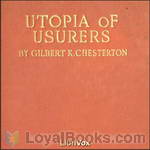 A Utopia of Usurers
A Utopia of Usurers
“Now I have said again and again (and I shall continue to say again and again on all the most inappropriate occasions) that we must hit Capitalism, and hit it hard, for the plain and definite reason that it is growing stronger. Most of the excuses which serve the capitalists as masks are, of course, the excuses of hypocrites. They lie when they claim philanthropy; they no more feel any particular love of men than Albu felt an affection for Chinamen. They lie when they say they have reached their position through their own organising ability...
|
 Lord Kitchener
Lord Kitchener
“The paradox of all this part of his life lies in this–that, destined as he was to be the greatest enemy of Mahomedanism, he was quite exceptionally a friend of Mahomedans.”
|
 The Victorian Age in Literature
The Victorian Age in Literature
|
 Forty-one years in India From Subaltern To Commander-In-Chief
Forty-one years in India From Subaltern To Commander-In-Chief
 The Days Before Yesterday
The Days Before Yesterday
 Darkest India A Supplement to General Booth's "In Darkest England, and the Way Out"
Darkest India A Supplement to General Booth's "In Darkest England, and the Way Out"
 In Indian Mexico (1908)
In Indian Mexico (1908)
 On the Trail of Grant and Lee
On the Trail of Grant and Lee
 My Service in the U.S. Colored Cavalry A Paper Read before the Ohio Commandery of the Loyal Legion, March 4, 1908
My Service in the U.S. Colored Cavalry A Paper Read before the Ohio Commandery of the Loyal Legion, March 4, 1908
 Books Before Typography A Primer of Information About the Invention of the Alphabet
Books Before Typography A Primer of Information About the Invention of the Alphabet
 The Churches of Coventry A Short History of the City & Its Medieval Remains
The Churches of Coventry A Short History of the City & Its Medieval Remains
 Sea: Its Stirring Story of Adventure, Peril, & Heroism. Volume 1
Sea: Its Stirring Story of Adventure, Peril, & Heroism. Volume 1
 A Winter Tour in South Africa
A Winter Tour in South Africa
 American Lutheranism Volume 1: Early History of American Lutheranism and The Tennessee Synod
American Lutheranism Volume 1: Early History of American Lutheranism and The Tennessee Synod
 Condition of the Working-Class in England in 1844
Condition of the Working-Class in England in 1844
 The Two Captains
The Two Captains
 Case of Wagner / Nietzsche Contra Wagner / Selected Aphorisms
Case of Wagner / Nietzsche Contra Wagner / Selected Aphorisms
 Human, All Too Human: A Book For Free Spirits, Part I
Human, All Too Human: A Book For Free Spirits, Part I
 Birth of Tragedy
Birth of Tragedy
 Early Greek Philosophy & Other Essays (Version 2)
Early Greek Philosophy & Other Essays (Version 2)
 The Thirty Years War
The Thirty Years War
 Mary Stuart
Mary Stuart
 Don Carlos
Don Carlos
 Maid of Orleans
Maid of Orleans
 History of the Revolt of the Netherlands
History of the Revolt of the Netherlands
 The History of the Thirty Years' War
The History of the Thirty Years' War
 Fiesco; or, the Genoese Conspiracy
Fiesco; or, the Genoese Conspiracy
 The Life and Adventures of Baron Trenck, Volume 1
The Life and Adventures of Baron Trenck, Volume 1
 The Life and Adventures of Baron Trenck, Volume 2
The Life and Adventures of Baron Trenck, Volume 2
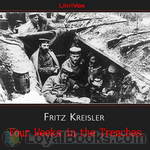 Four Weeks in the Trenches
Four Weeks in the Trenches
 Letters of Lt.-Col. George Brenton Laurie (commanding 1st Battn. Royal Irish Rifles) Dated November 4th, 1914-March 11th, 1915
Letters of Lt.-Col. George Brenton Laurie (commanding 1st Battn. Royal Irish Rifles) Dated November 4th, 1914-March 11th, 1915
 The Psychology of Nations A Contribution to the Philosophy of History
The Psychology of Nations A Contribution to the Philosophy of History
 The Christian Church in These Islands before the Coming of Augustine Three Lectures Delivered at St. Paul's in January 1894
The Christian Church in These Islands before the Coming of Augustine Three Lectures Delivered at St. Paul's in January 1894
 Greece and the Allies 1914-1922
Greece and the Allies 1914-1922
 Trade and Travel in the Far East or Recollections of twenty-one years passed in Java, Singapore, Australia and China.
Trade and Travel in the Far East or Recollections of twenty-one years passed in Java, Singapore, Australia and China.
 English Literature: Modern
English Literature: Modern
 From Slave to College President Being the Life Story of Booker T. Washington
From Slave to College President Being the Life Story of Booker T. Washington
 The Story of the Guides
The Story of the Guides
 A Short History of England
A Short History of England
 Orthodoxy
Orthodoxy
 What's Wrong With the World
What's Wrong With the World
 The Ballad of the White Horse
The Ballad of the White Horse
 What I Saw in America
What I Saw in America
 The New Jerusalem
The New Jerusalem
 A Utopia of Usurers
A Utopia of Usurers
 Lord Kitchener
Lord Kitchener
 The Victorian Age in Literature
The Victorian Age in Literature
 The House of the Combrays
The House of the Combrays
 Appearances Being Notes of Travel
Appearances Being Notes of Travel
 A Modern Symposium
A Modern Symposium
 Religious Life of Virginia in the Seventeenth Century The Faith of Our Fathers
Religious Life of Virginia in the Seventeenth Century The Faith of Our Fathers
 Tobacco in Colonial Virginia "The Sovereign Remedy"
Tobacco in Colonial Virginia "The Sovereign Remedy"
 Over the Top With the Third Australian Division
Over the Top With the Third Australian Division
 The King's Highway
The King's Highway